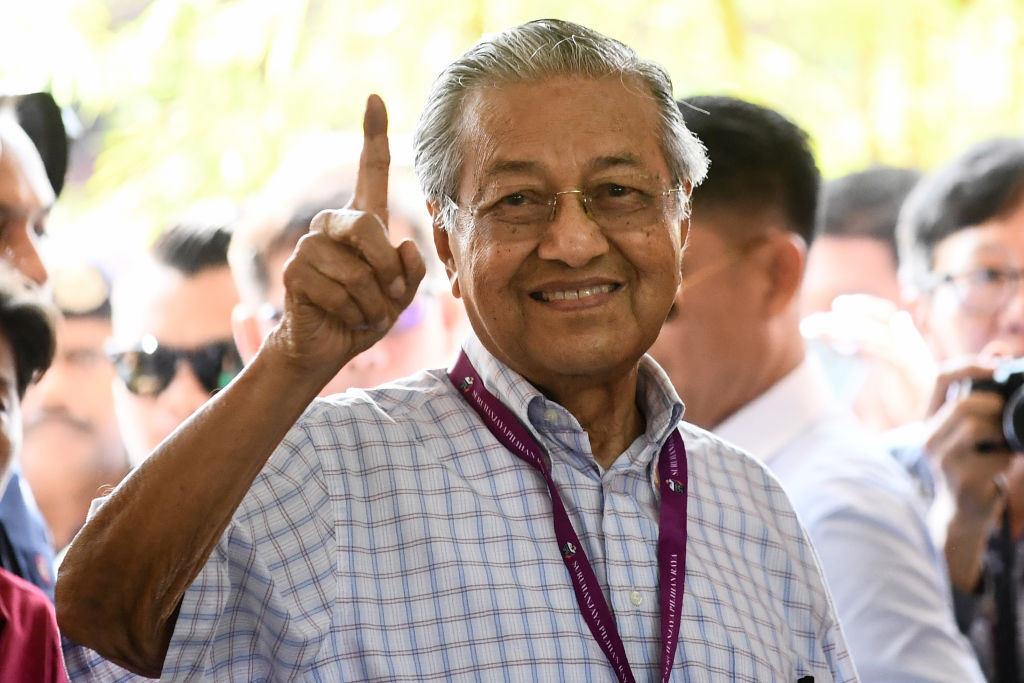Update, May 10, 3.15am: Mahathir holds press conference saying Pakatan Harapan has achieved majority.
The opposition coalition Pakatan Harapan (PH) crossed the minimum threshold of 112 seats needed to form Malaysia's new government, according to figures from the Election Commission, early Thursday, May 10 morning.
Incumbent Barisan Nasional had taken 79 seats with just a few left to count.
In a result that has stunned the world, Malaysia's ruling Barisan Nasional (BN) coalition, which has dominated politics since 1974, was defeated by the opposition Pakatan Harapan (PH) coalition.
Caretaker Prime Minister Najib Razak, who was seeking a third term, was denied by the voters at the polls.
As of 3am on May 10, official results indicated that PH had won enough parliamentary seats for a simple majority of more than 112 out of a total of 222.
This means that former Prime Minister Mahathir Mohamad, who will be 93 years old this year, will once again lead the country.
Najib will reportedly give a press conference at 11am on May 10.
As the world takes stock of this shocking victory for Mahathir and the PH, here's what could lie in store for Malaysia, her neighbours, and the rest of the world.
Abolish GST, Anti-Fake News law
In one of PH's biggest promises in the run-up to the election, they promised to abolish the Goods and Services Tax (GST) that was implemented by Najib in 2015.
It currently stands at 6 percent, and was commonly blamed for increasing the cost of living for Malaysians.
Mahathir has also pledged to repeal a number of laws he called "oppressive" towards the people, including the Sedition Act of 1948 and the Printing Presses and Publications Act of 1971.
The list also included the controversial Anti-Fake News Act, recently passed by the government in March 2018.
Review Chinese issues
Mahathir has also promised to carefully scrutinise investments from overseas Chinese companies if he took power.
Reflecting concerns on the ground over foreign money and foreign workers, Mahathir said that the issues were of sovereignty and economic inequality:
"Lots of people don’t like Chinese investments. We are for Malaysians. We want to defend the rights of Malaysians. We don’t want to sell chunks of this country to foreign companies who will develop whole towns."
China is Malaysia's biggest foreign investor, contributing 7 percent of RM54.7 billion in 2017.
But there have been similar tensions in other places where China has invested, like Sri Lanka and countries in Africa and South America.
He also said that he would restart negotiations on rights and access to the South China Sea, given Malaysia's claim to this internationally-disputed area.
"We have to ensure our voice is heard because Malaysia does have islands in the area and this we must uphold."
[related_story]
Tension with Singapore?
Singaporeans of a certain age will recall the often contentious relations between then-PM Mahathir, and the late PM Lee Kuan Yew in the 1980s and 1990s.
In fact, Najib referred to this rocky relationship during the 8th Singapore-Malaysia Leaders’ Retreat in January 2018:
"We certainly do not want to return to the era of confrontational diplomacy and barbed rhetoric between our two countries. It was an era that we want to forget."
As LKY himself recounted in his autobiography Third World to First:
"Mahathir was candid about his deep anti-Singapore feelings. He recounted how, as a medical student in Singapore, he had directed a Chinese taxi driver to the home of a lady friend, but had been taken to the servants' quarters of this house. It was an insult he did not forget."
However, the two leaders did manage to find some common ground and maintain a working relationship.
With Mahathir once more assuming the seat of power, there could be a potentially interesting meeting up ahead with LKY's son, PM Lee Hsien Loong.
Mahathir stepped down as Malaysian PM in 2003, a year before PM Lee became the premier.
Will Mahathir be more amenable to Singapore this time round?
Time will tell.
What next for BN and PH?
Mahathir might be the next PM, but his tenure might be shorter than expected.
Mahathir and the PH previously stated that if they managed to pull of a victory, they would allow Anwar Ibrahim to compete for a seat in Parliament, and if he wins, allow him to assume the role of PM.
Anwar, leader of Parti Keadilan Rakyat(PKR), is currently serving a prison sentence on sodomy charges until June 11.
In January 2018, Bernama quoted PH's Saifuddin Abdullah as saying that if the PH won, it would “immediately” begin legal proceedings to obtain a Royal Pardon from Malaysia’s monarch and Head of State to release Anwar from prison.
Reading from a document titled “Consensus of the PH”, he said:
“This is so that Datuk Seri Anwar Ibrahim can immediately act in the Federal Government and then be appointed as the 8th prime minister.”
If Mahathir does hand over the reins of power to his protégé turned rival turned unlikely ally, it will complete one of the most dramatic political stories in Southeast Asia's history.
Related story:
Top image by JEWEL SAMAD/AFP/Getty Images
If you like what you read, follow us on Facebook, Instagram, Twitter and Telegram to get the latest updates.
